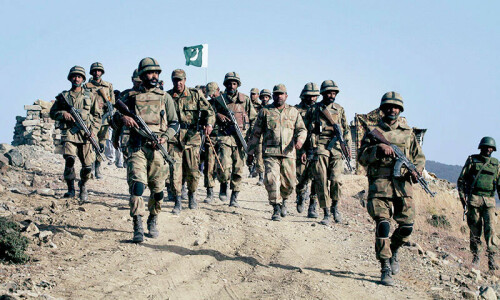It is probably not a good idea to cap large tendencies in pithy statements; that is usually a physicist’s privilege. But if one were to try, it wouldn’t be very wild to suggest the crux of modern politics is the search for sovereignty. The West pioneered that search and gave us colonialism with thanks.
In our search for sovereignty, we Southern Asians fragmented ourselves. Not that we were tightly knit before. Just that the pieces we broke ourselves into showed how modern colonialism had corroded our ancient, medieval and a-modern selves. Made brittle, we became familiar to forked existence. In 1947, we attained sovereignty by dividing ourselves. Tragic flaw.
But of course it doesn’t end there. That tragic flaw has meant we remain in search of what we have declared ourselves to be. Southern Asia is made of sovereign states in search of sovereignty.
Consider the fuss over Pakistan’s sovereignty since the killing of Osama bin Laden. Among the heavyweights, it was the ex-enlightened moderator, who claimed the American raid was a violation of Pakistan’s sovereignty. This version interpreted sovereignty in garrison language. Which is unsurprising because the army is not used to subtle differences between being a source, a custodian and a guardian of state’s sovereignty.
The other came from Punjab chief minister. “Pakistan’s sovereignty is being violated in exchange for dollars.” Foreign aid had become “venomous” for, or “undermined,” national sovereignty, complained Shahbaz Sharif. This was an extension of the controversy around the Kerry-Lugar aid bill which bloated in the ageing days of 2009.
This version interpreted sovereignty in the autarchic mould – a kind of PML-N variant of arguments, collectively called dependency theory, pioneered by economists of Marxist persuasion to explain persistent underdevelopment in Latin America. Then, as now, it belched.
In an early reaction, the foreign secretary went legal. Salman Bashir’s reliance on norms of international obligations and the UN charter gave away the indecision within. Did it constitute a violation of sovereignty? States do use legal arguments for pretending clarity in public arena when a political position is not finalized. It was a good cover for the “blind spots in the radar coverage due to hilly terrain” (PR. NO.152/2011, Ministry of Foreign Affairs), that allegedly allowed US helicopters to fly undetected. But the circumspection was evident. “Pakistan says US may have breached sovereignty,” a UK daily’s headline on the story noted.
A political stance soon emerged. The president and the prime minister made it clear in their remarks Pakistan’s sovereignty was violated and that it was unwelcome. This was a dignified position for a hurt state.
But then it became ridiculous.
Last checked Yousuf Raza Gilani, speaking on behalf of the state, had asked China to convey the message to United States that “our sovereignty be respected.” Is that statecraft? A Foreign Office spokesperson said Pakistan will not tolerate violation of sovereignty. What does that mean in policy language? What will Pakistan’s intolerance of sovereignty violation look like?
This loss of proportion is characteristic of Third World politics. But this particular instance must worry the people of Pakistan.
The pact for Pakistan was forged for its people. Its citizens were to be the source of supreme political authority or sovereignty. It is an old truth: popular sovereignty is the credo of modern states. But somehow we need to repeatedly remind ourselves of it. If there was no vision, or even an unpolished idea, of making its citizens the source of Pakistani sovereignty, then its founders were not creating a modern, autonomous political society.
All indications are they were; thus implying the citizen of Pakistan should have become the arbiter of its destiny. In practice, this should have meant primacy of democratic politics, subordination of armed forces to civilian political authority and some form of separation between religion and politics. No modern political organisation which claims to exist for the people can compromise on any of these features.
All of them have been compromised. Ideologically, sovereignty was made ethereal in the Objectives Resolution of 1949. Practically, the innovative Ayub Khan inaugurated its ongoing garrisoning a decade later. These left very little for institutions to be responsible towards their own survival and people’s wellbeing. What happened to the people? A charitable look at Zulfiqar Ali Bhutto’s politics may help recover flickering shots of popular sovereignty.
But only that for a country that is claimed to have been born of popular upsurge. There are no people in the incomplete biography of Pakistan’s sovereignty.
The confusion over source of Pakistan’s sovereignty is absurd. There are, effectively, overlapping claims by the army, political executive, the religionists and the fanatics. All claim supreme authority but none think of the people. It is a condition somewhat similar to pre-modern Europe where the lords, vassals and popes excluded the peasants and ignored the burghers. The burghers became the bourgeoisie and then citizens; the peasants followed. It appears to be going the other way around in Southern Asia.
It is easy to think of sovereignty as a surreal condition; an obscure object of desire – like Luis Buñuel’s idea of conjugal love. But sovereignty isn’t a trivial trope of populist politics – something that flippant remarks on it in Pakistan, India and elsewhere often suggest. In times of absolutism in Europe, when sovereignty was located in the monarch’s person, scholars arguing for its depersonalization feared for their lives. The message was, and remains, that it is the ultimate expression of political power.
A condition of sovereignty is that the claim of supreme political authority must be recognized within and without. Convincing others of the claim has been a challenge for nations eager to become states. Pakistan claims to be both and the world recognizes that claim. It’s the domestic parceling of competing authority claims that plagues Pakistan’s sovereignty puzzle.
It is what works up the paranoia and weakens the state. People are the only common and real denominator of Pakistan. And also the rightful claimants to sovereignty. But it isn’t as easy as stating that.
Finally, questions for the generals and the leaders: if Osama bin Laden was living in Abbotabad for five years and inspiring PNS Mehran-type attacks, was he not excessively, incessantly and deliberately violating or undermining Pakistani sovereignty? Wasn’t killing him an act of sovereign restoration; especially if the state didn’t know of his existence?
Atul Mishra teaches politics and international relations at Central University of Gujarat, Gandhinagar, India. Views expressed are personal.
The views expressed by this blogger and in the following reader comments do not necessarily reflect the views and policies of the Dawn Media Group.














































